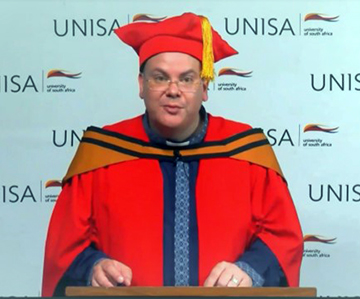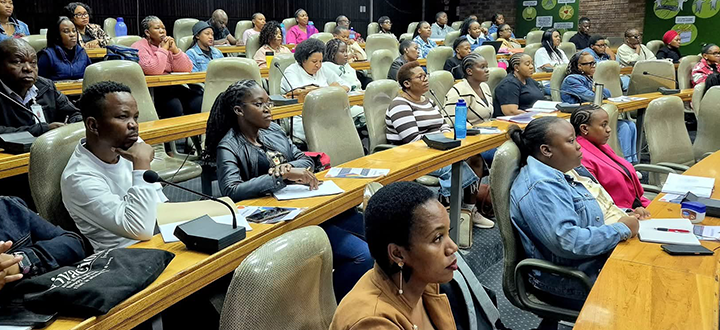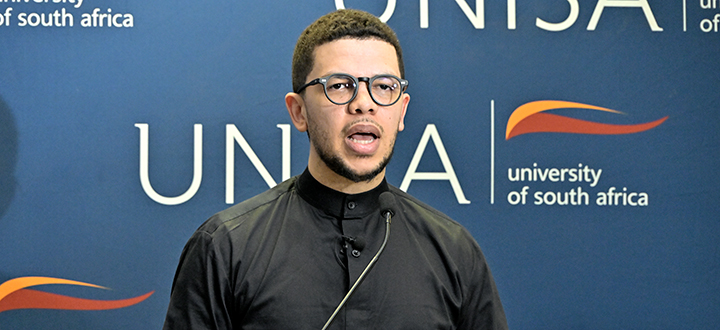College of Human Sciences
Why classical European philosophy is relevant to African ubuntu
Prof Callum Scott, of the Department of Philosophy, Practical and Systematic Theology, delivered his virtual inaugural lecture, entitled "Becoming and being a person through others: African philosophers' ubuntu and Aquinas's mutual indwelling in comparative discourse", on 1 March 2023.
The tragedy of Sheila Seleoane

Prof Callum Scott
Prof Scott’s lecture started with the chilling story of Sheila Seleoane. Seleoane, the 61-year-old daughter of a South African expatriate, passed away in her flat in the United Kingdom in 2019. Her body was only discovered in 2022, after numerous complaints by the neighbours regarding a stench coming from her flat. Philosophy is the discipline of asking questions, and this incident raises several. Did she feel at home in that community? This was the perfect prelude to Scott’s discussion of the touchpoints between European and African philosophy.
Scott’s influence for this lecture was St Thomas Aquinas. Aquinas argued the existence of God, and he dealt with issues such as truth, understanding and the fundamental questions of metaphysics, not to mention moral and political theories. The philosophical and theological school that arose as a legacy of his work came to be known as Thomism.
Scott said that his interests in this area go back to his school days. He was educated in a convent school run by Irish Dominican Sisters, and thus grew up with exposure to Aquinas. He stated that his research interests are "in his blood". His lecture brought Aquinas’s corpus out of the thirteenth century and attempted to make him relevant to the temporal moment and context within which we find ourselves.
Different yet compatible views
Scott’s lecture covered the intersection of the work of Aquinas and African philosophy, specifically regarding the dimension of human relationality. "Both Aquinas and African philosophy, broadly, place great value on the encounter and interaction between people in the formation of and the living out of a teleological human state of being," explained Scott. "From the African perspective, this is ubuntu (umuntu ngumuntu ngabantu), whilst Aquinas argues that relationality between people can reach the degree of their existences dwelling mutually."
Scott then asked the potent question: "Should the lessons and teachings of the master [Aquinas] still be studied?"
The lecture was inspiring for both academic and pastoral reasons, and highlighted the importance of studying how the indigenous knowledge systems of the people and the formal philosophical and theological traditions of the church meet.
Research prowess
Scott’s master’s and doctoral degrees in philosophy focused on the relationship between science and religion, and his doctoral thesis, in particular, on the utilisation of what he came to call the "ontological epistemology" of St Thomas Aquinas.
Since completing his doctorate, he has maintained his interest in Aquinas’s massive corpus of philosophical and theological works, but his focus has shifted slightly. "While the engagement of science and religion remains an interest of mine," commented Scott, "I would say that more formally I have moved away from purely engaging in philosophy of science and philosophy of religion, to an interest in Thomist epistemology."
* By Veli Mabona, Marketing Assistant, College of Human Sciences
Publish date: 2023-03-09 00:00:00.0


 Unisa and ATUPA recognise researchers for ingenuity and innovation
Unisa and ATUPA recognise researchers for ingenuity and innovation
 Recognising the unceasing resilience of women
Recognising the unceasing resilience of women
 Unisa and SHECASA promote institutional health and safety
Unisa and SHECASA promote institutional health and safety
 Effectual partnership to advance public health knowledge
Effectual partnership to advance public health knowledge
 OR Tambo remembered as a radical democracy builder
OR Tambo remembered as a radical democracy builder